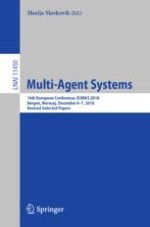2019 | Book
Multi-Agent Systems
16th European Conference, EUMAS 2018, Bergen, Norway, December 6–7, 2018, Revised Selected Papers
Editor: Prof. Marija Slavkovik
Publisher: Springer International Publishing
Book Series : Lecture Notes in Computer Science
